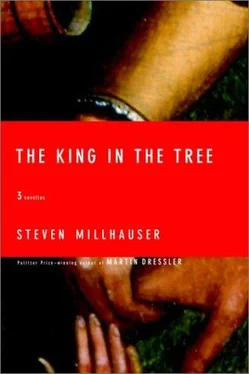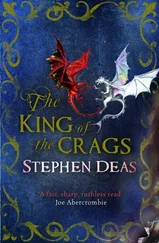Don Juan rode on into the green Arcadian countryside. Plump sheep with delicate dark legs grazed here and there— somehow the legs reminded him of knitting needles sticking out of lumps of yarn — a forlorn shepherd sat sighing under a tree, and the warm air trembled with a dim sound composed of stream water, bees, the distant notes of a reed pipe, and the faint tinkle of sheep bells. Juan came to a solitary place, where he dismounted. He tethered his horse to a low branch and walked on a little way. A broad shady tree, with round-lobed leaves he did not recognize, grew on a slope not far from a narrow stream.
He sat down and leaned back against the tree. One wrist rested lightly on his raised knee; the other hand lay on the ground beside his outstretched leg. His eyelids began to close, the brown stream flickered with spots of yellow sun and tea-colored leaf shade, and it seemed to him that he was about to fall into a deep sleep, though at the same time he was painfully alert. Across the stream a dense, cool-looking thicket of gnarled trees retreated to form a sunny opening, a small, secret glade at the edge of the stream. As he half watched, shifting his heavy gaze from dark to bright, he saw a movement in the thicket, and a shepherd boy stepped out of the trees into the bright place.
He was thirteen or fourteen years old and wore the white Arcadian tunic, which came down to his knees and was fastened loosely over his left shoulder; his right shoulder was bare. Looking toward the thicket from which he had emerged, he beckoned with his fingers. A moment later a shepherd girl stepped out of the trees, smiling and reaching out her hand. Her straw-colored hair was pulled back lightly on both sides and gathered in back with a comb. She wore a loose white tunic bound at the waist with a belt of straw; whenever she moved, the cloth tightened for an instant against her small breasts, which seemed to appear and disappear. They stood holding hands, smiling at each other as if they were about to burst into laughter. Suddenly the boy dropped her hand and ran to the stream, where he crouched down to scoop water into his hands. He rose carefully, carrying the water to the girl, who bent over his hands to drink.
From under the tree Juan watched, not hidden from view though protected by the shade; and as he watched, keeping very still so as not to startle them, he had the sense that the boy had caught sight of him on the slope across the stream— indeed, he was certain of it, for the boy began glancing deliberately in his direction — and soon the girl began casting quick looks at him, the dark stranger watching in the shade. But instead of growing shy, instead of moving back or escaping into the trees, they seemed to become bolder in his presence. Now they began flicking drops of water at each other and leaping away, as if for the amusement of the watcher across the water. Then the boy closed his eyes, reached out both hands, and began searching for the girl, who kept laughing and stepping aside. Once his hand seized her hip before she twisted away. Suddenly they bound up their tunics under their legs and waded into the stream. They held hands as they bent over to search for things in the water, glancing up now and then to catch sight of the stranger watching them. After a while they climbed out of the stream and sat on the grass, where they stretched out their brown legs glistening with water, leaned back on their arms, and flung their heads back, eyes closed against the sun. For a time they stayed that way, as if to invite a secret inspection by whoever happened to be looking at them: here we are, two young bodies, male and female — study us well.
The boy grew restless first. He glanced at the girl, whose eyes remained closed, her face upturned and glowing in the light of the sun. He looked about, then picked a blue wildflower that grew near his shoulder. Bending toward her, he placed it carefully in her hair. In the brilliant sun her pale hair, straw-colored but shot through with whitish yellow and milky brown, gave off little glimmers, as if it contained flecks of metal. The boy tipped back his head to study the effect of his wildflower, leaned closer to make an adjustment. She gave a slow, drowsy smile, raised one hand lazily to her hair, and touched the flower. Smiling at each other, they seemed to come to an agreement. The boy stood up, reached out his hand, and lifted her to her feet; and throwing a bold, unmistakable look at Juan across the stream, they walked hand in hand out of the sunny glade and disappeared into the trees.
And Juan was shaken: they hadn’t mocked him, but they had displayed themselves proudly before him. They had drawn him into the circle of their not-quite-innocent love play, in the spirit of those who must proclaim their happiness, must reveal their superiority to all mere mortals who are born, grow old, and die — and especially to all solitary watchers in the shade, whose task it is to witness the unbearable joy of laughers in the sun. And after all, hadn’t there been a touch of mockery in it? For how could they fail to be amused by the sight of a shadow-man banished from sunlight, a no-man who had crept out of the rush of things into the secret, bitter shade?
Juan stood up. He had become a pathetic creature. Children laughed at him — at him, Don Juan Tenorio — the grim man brooding under a tree. No doubt others were laughing at him too. It was very quiet, and as he listened he seemed to hear sounds of laughter rising all about him: the laughter of shepherds and shepherdesses in Arcadia, the laughter of actors playing Charon and Dido, Tantalus and Ixion, the laughter of farmers plowing their fields and laborers swinging their picks, the laughter of chambermaids and footmen and gardeners and grooms — a low, rippling hum of laughter like a sound of cicadas in high grass. It was the sound of all those who walked in the midst of life, who didn’t sit off to one side, dreaming in the shade. What was he? Who? He was no longer Don Juan. He had wandered away from himself, he couldn’t find his way back. Who are you? I am the one I no longer am. Basta! He would have his life. He would go to her room that night. He would beg her — or kill her. He would take her by force. He would kill anyone who got in his way. He would do something. For love, my dear Georgiana, is not a sad man sitting under a tree, but a raging sword flashing with blood and fire.
Don Juan walked over to his horse, untethered it, swung up into the saddle, and rode out of Arcadia.
When he returned to the house he found Georgiana in the drawing room, looking tired as she leaned back on a sofa and held flat in her lap, in one limp hand, an open fan that pictured a landscape. “Oh, there you are,” she said, glancing up at him as if she had something more to say, but saying nothing. Juan went up to his sitting room and stretched himself across the sofa, where he lay yawning repeatedly, as if something were wrong with his jaw. At dinner there was still no sign of Mary. Georgiana seemed distracted, and Hood told a long, rambling anecdote about a laborer in his under-realm who had been trapped with his pick in a collapsed tunnel. The poor fellow had hacked his way in another direction, advancing slowly with diminishing strength and gradually losing all sense of time; on the point of death, he felt his pick break through the wall and found himself in China. The solution to the mystery was that he had broken into a Chinese temple constructed under Hood’s supervision years ago, abandoned, and soon forgotten. The laborers who rescued the poor man said he seemed confused and kept insisting that he had reached China. “Which of course he had,” Hood added, as they walked along the Ymber at dusk. “For say a man reads of China, dreams of China, and does not go to China. And say another man hacks his way through a wall and enters a Chinese temple. Now riddle me this: which China is more real?”
Читать дальше












